Lunchtime Lectures
Lunchtime Lectures provide talented scholars with the opportunity to share their Digital Humanities work with interested students, faculty, staff, and members of the community over lunch. All workshops are free and take place during lunchtime.
Fall 2023
Spring 2023
.jpg)
Friday, April 28 | 3 pm CST | Loyola Hall, Conference Room 318. Please join us to Celebrate the end of the academic year! Please register for this event by using this link: https://tinyurl.com/semesterendcelebration
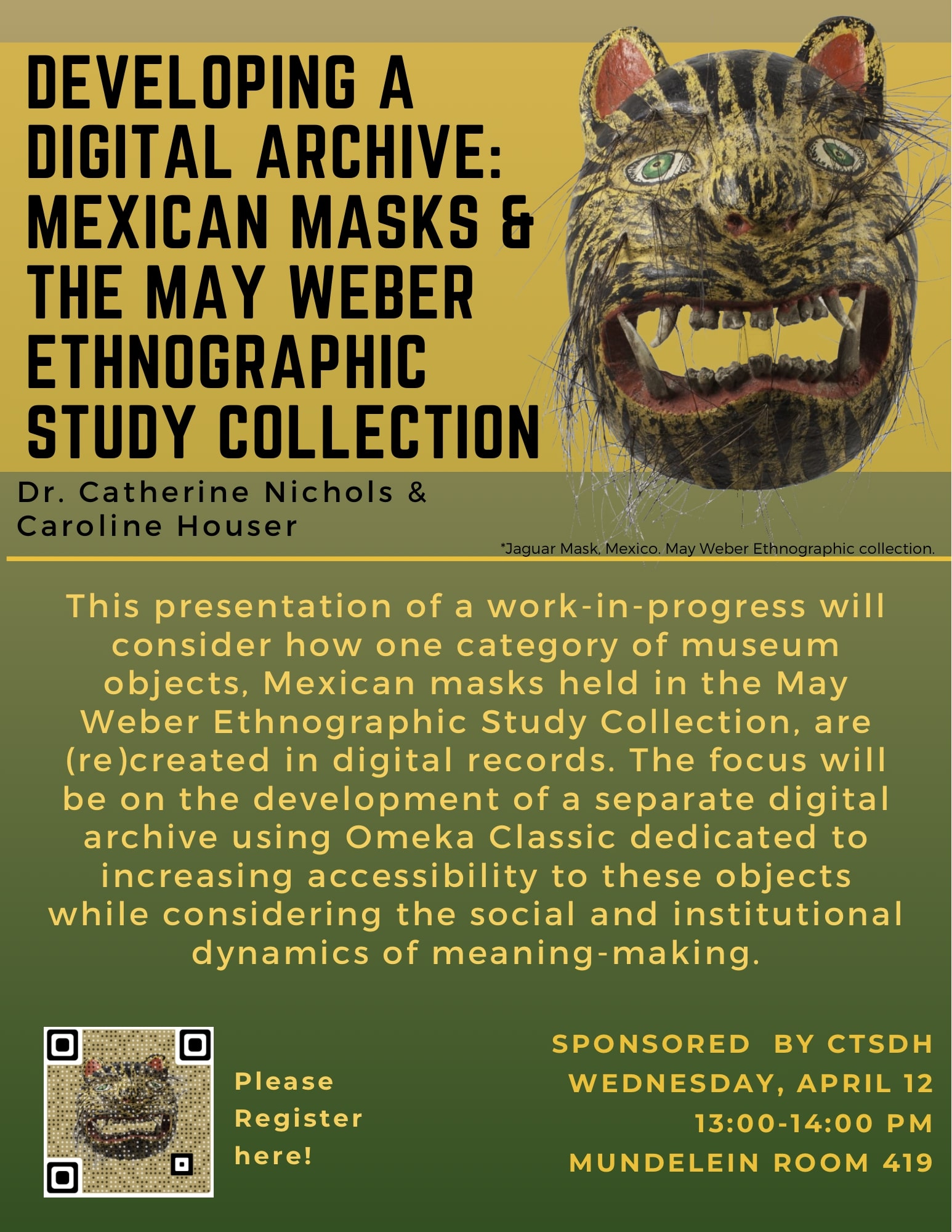
Catherine Nichols, Caroline Houser | Wednesday, April 12 | 1 pm CST | Mundelein 419. In recent years, anthropologists, information scientists, and digital humanists have called attention to the ways in which metadata standards and similar descriptive practices both increase discoverability and position objects within interpretive domains. This presentation of a work-in-progress will consider how one category of museum objects, Mexican masks held in the May Weber Ethnographic Study Collection, are (re)created in digital records. The focus will be on the development of a separate digital archive using Omeka C dedicated to increasing accessibility to these objects while considering the social and institutional dynamics of meaning-making. Please register for this event by using this link: https://tinyurl.com/MexicanMasks
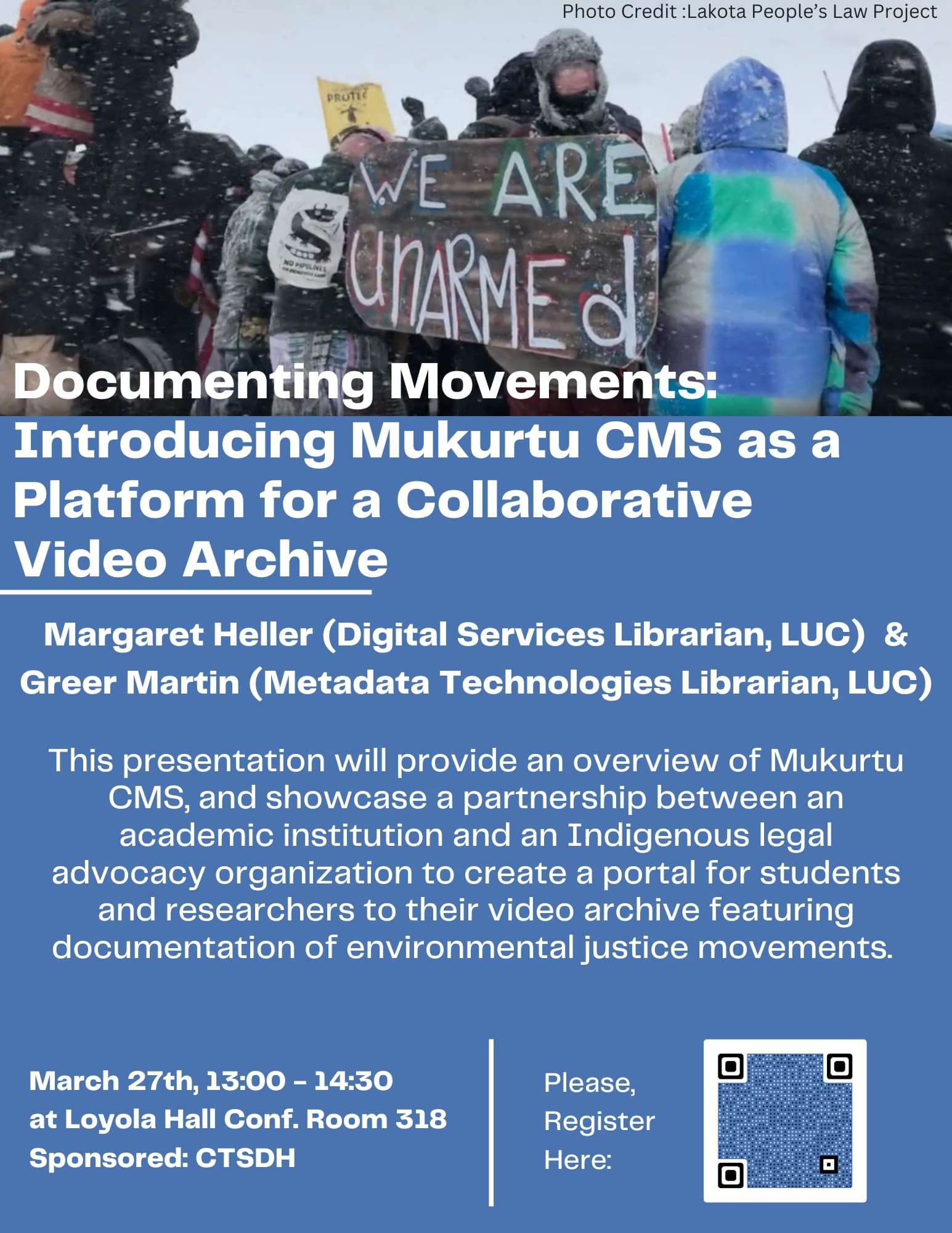
Margaret Heller and Greer Martin | Monday, March 27 | 1-2:30 pm CST | Loyola Hall, Conference Room 318. Mukurtu CMS, an open-source digital access platform, was designed for Indigenous communities to determine and enact cultural protocols in a digital space by managing the access and use of cultural materials and knowledge. What about for political action that Indigenous communities are engaged in and documenting right now? This presentation will provide an overview of Mukurtu CMS, and showcase a partnership between an academic institution and an Indigenous legal advocacy organization to create a portal for students and researchers to their video archive featuring documentation of environmental justice movements. Please register for this event by using this link: https://tinyurl.com/MukurtuCMS. Food will be provided.
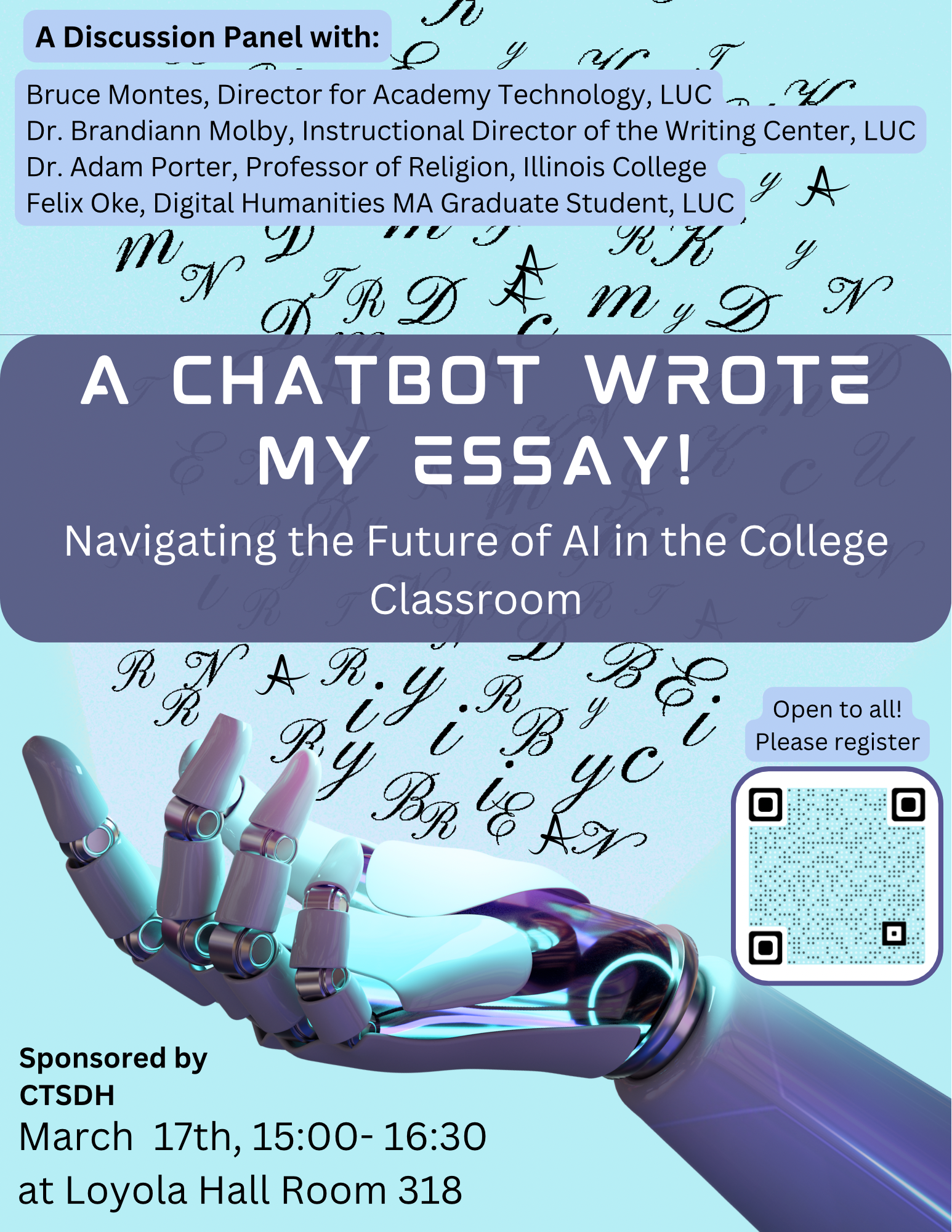
A Chatbot Wrote My Essay: Navigating the Future of AI in the College Classroom
Bruce Montes, Brandiann Molby, Adam Porter, and Felix Oke | Friday, March 17 | 3 PM - 4.30 PM CST | Loyola Hall, Conference Room 318. Join us for an open and interactive discussion on the challenges—and potential opportunities—of incorporating Chatbot and AI technologies in the undergraduate classroom. Our interdisciplinary panelists from Digital Humanities, the Writing Program, Computer Science, and Religion will share their experiences and concerns with the rise of these technologies in education. **Note: A chatbot wrote this panel description. Please register for this discussion by using this link: https://tinyurl.com/AChatbotWroteMyEssay. Food will be provided.
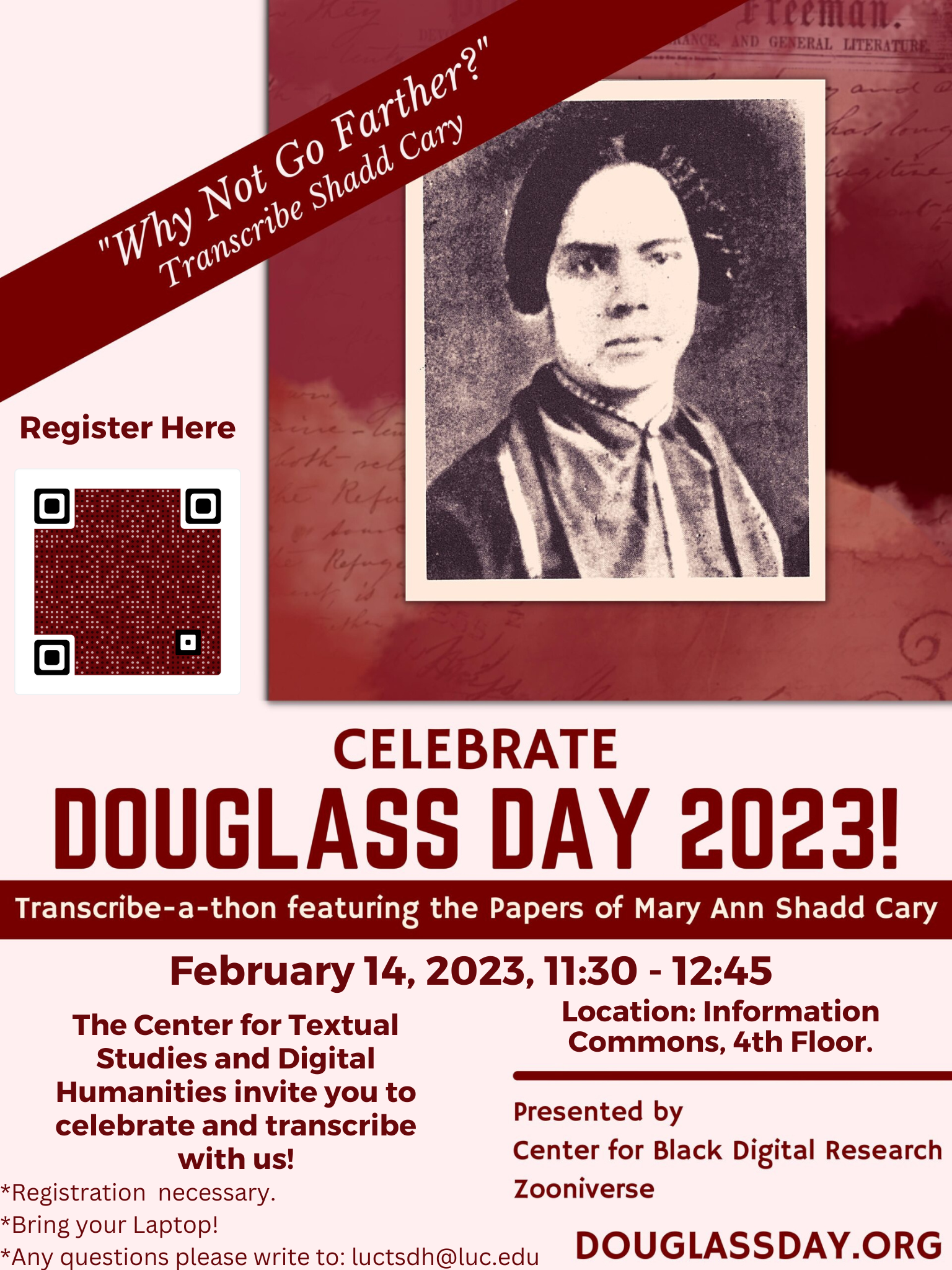
Douglass Day 2023!
Tuesday, February 14th | 11:30 AM-12:45 PM CT | Information Commons, 4th Floor. Join the CTSDH to wish a happy birthday to Frederick Douglass! Douglass Day is an online and international celebration of Frederick Douglass’s chosen birthday (Feb 14), run by The Center for Black Digital Research at Penn State ( https://douglassday.org/ ). The day celebrates Douglass and Black history by gathering communities to transcribe the papers of Mary Ann Shadd Cary. Please register for the event by using this link: https://tinyurl.com/douglassday. Food will be provided.
Fall 2022
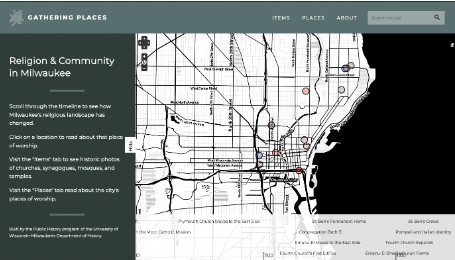
Dr. Christopher Cantwell | Thursday,November 17th | 12:30PM-1:30PM | Loyola Hall, Conference Room 318
The rise of digital humanities methods and pedagogies has fundamentally altered the study of religion. At the same time, our networked world currently is experiencing a profound shift in the nature of religious life. How might these two trends be brought into conversation? Can one help understand the other? This talk will draw upon a recent digital public history project to explore how religious studies, digital humanities, and public history can fruitfully work together to build a vibrant digital archive of our current moment.
Please register here for this Lunchtime Lecture. Food will be provided.

Melissa Bradshaw, Ian Cornelius, Elizabeth Hopwood, Frederick, and Marta Werner | Wednesday, November 9th | 12:00 PM - 2:00 PM | Loyola Hall, Conference Room 318
Presentations of digital humanities projects by faculty in the department of English.
Please register here for this Lunchtime Lecture. Food will be provided.

Dr. Emily Hutchinson | Tuesday, November 15th | 2:30 PM-1:30 PM | Loyola Hall, Conference Room 318
Mapping is a critical element of my scholarly work, and a useful form of evidence. Mapping often reveals things that are otherwise hidden in textual, artistic, or material sources. It offers insights into the physicality of a space, but also into patterns of use. The primary aim of Digital Paris c. 1400 is to have this platform answer queries for users that range from the very simple and straightforward (such as locating a particular street) to the more complex (for example: tracing the trajectory) and identifying ONLY the sites of interaction with women). Mapping evidence from our textual sources forces us to recognize that people's experiences differ across the terrain in very concrete ways, and mapping enables these realities to come to life in ways that we might otherwise overlook.
Please register here for this Lunchtime Lecture. Food will be provided.
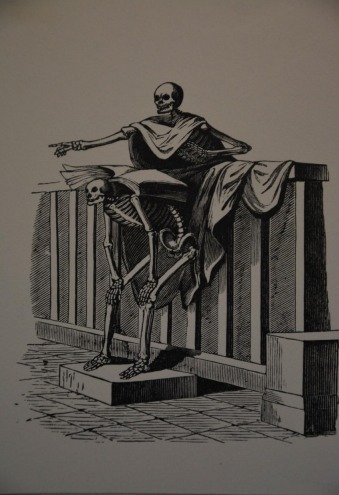
Dr. Chris Lukasik (Purdue University) | Thursday, October 20th | 12:30 PM - 1:30 PM | Loyola Hall, Conference Room 318
While the significance of illustration to the rise of a mass visual culture across the nineteenth century has been well documented, our understanding of what illustration meant during the period leading up to its dominance remains confused. Using a combination of quantitative and qualitative methods, this talk examines the transformations in the medium and meaning of illustration as they appear in periodicals published in America from 1775 to 1825. Evidence from this case study will be discussed as it pertains to the study of literature, art history, and book history as well as our understanding of the rise of optical media across the nineteenth century.
Please registerhere for this Lunchtime Lecture. Food will be provided.
Fall 2019
A Showcase of Digital Philology Projects using the OCHRE Database Platform
Miller C Prosser (University of Chicago) | Wednesday, September 11
Text criticism, lexicography, epigraphy, GIS data and digital imaging, complex querying, and web publication. These are a few of the topics highlighted in this showcase of research projects using the Online Cultural and Historical Research Environment (OCHRE). Along with this show-and-tell, we also wrestle with the challenge of knowledge representation in Digital Humanities. From the interpretation of a single stroke on the page, through to the publication of an open data set on the web, how should we model our data so it can be put to good use in our research? The case-studies for this Lunchtime Lecture are drawn from various philology projects working in a wide range of corpora; from Shakespeare, to the Hebrew Bible, to the little-known epic tales from ancient Ugarit.
People-Powered Digital Humanities: Opportunities for Engagement and Collaboration on the Zooniverse Platform
Dr. Samantha Blickhan | Wednesday, October 9th | 12:30-1:30 PM | CTSDH
In this session, attendees will hear about digital humanities research taking place on Zooniverse.org. Subjects will include the aims and outcomes of crowdsourcing projects being hosted on the platform; internal research being conducted involving the evaluation of newly-built tools for online crowdsourced transcription; and how Zooniverse makes tools for crowdsourcing available to the public free of charge.
Sustainability for Digital Projects and Their Communities
Margaret Heller | Wednesday, October 23rd | 12:30-1:30 PM | CTSDH
Community technology projects underpin so much of the digital humanities and libraries, but building these communities and maintaining them over time is not easy. Various models for sustainability have been tried over the past 150 years, and there are some clear better practices to follow when planning projects. Margaret Heller, Digital Services Librarian at Loyola University Chicago Libraries will discuss the special challenges in making community digital academic and library projects sustainable, based on her 2019 book Community Technology Projects: Making Them Work.
Sarah Ketchley | Monday, Sept. 30th | 3:00 PM-5:00 PM | Information Commons 120
The University Libraries invites you to attend a hands-on workshop introducing the Gale Digital Scholar Lab, a new library resource that enables students and researchers to do text mining and analysis on materials from Gale Primary Sources, which includes digitized texts from the 16th century through the 20th century. This workshop will give attendees a chance to familiarize themselves with the Digital Scholar Lab, and ask questions about the interface and workflow. It is also an excellent opportunity for discussions related to text mining, particularly related to how to obtain texts to work with, and questions of representativeness – what makes a good textual corpus? The workshop will include a discussion of pedagogy and ideas for upcoming classes, and current research use cases for the Lab.
This workshop will be appropriate for researchers from a range of disciplines, and requires no prior experience with digital research methods. Prior to the session, you’re welcome to access the Gale Digital Scholar Lab via the library website to log-in and explore the resource. We’ll also use this session to gauge interest in a faculty learning community for digital research and pedagogy.
Jonathan B. Singer | Friday, October 11th, 11:30 - 12:30 | School of Communications, Water Tower Campus
Podcasting has been around since 2004, but entered a golden age with the Serial Podcast. Millions of people are podcasting and advertisers are pouring millions of dollars into them. So why would an academic want to podcast when you could write a book, a chapter, an article, or just have coffee with your colleague? Is it really as easy as everyone says it is to create a podcast? If so, why am I not doing it already? Questions to these answers and more from Jonathan B. Singer, Ph.D., LCSW, associate professor of social work and founder and host of the award winning Social Work Podcast.
Caroline McCraw | Friday, October 18th, 12:00 - 1:30 PM | CTSDH, Loyola Hall 318
What are the possibilities of a digital text? What are its limitations? In an attempt to open ourselves up to the poetic potential of text in a digital space, this event is one part crash survey of the history and context of electronic literature, one part screening/viewing of contemporary digital text work, and one part creative workshop in which participants will utilize the provided templates to experiment with creating their own digital-born text pieces.
Spring 2019
Taylor BrownFriday| March 29, 1:30-3 pm | CTSDH
How are our digital environments affecting the connections we make with others? Is social media the detriment of modern society? The project brings purpose to the quasi-social media environment, GitHub, to facilitate better, more meaningful conversations about art and the creative process using a digital-periodical framework. Join us as we tour the backyard and vote on submissions for the May 2019 issue!
Margaret Heller and Niamh McGuigan | Wednesday, February 27, 12:30-2PM | CTSDH
Get ready for Fair Use Week (February 25-March 1, 2018) with a guided discussion with Niamh McGuigan and Margaret Heller from the University Libraries about what fair use really means and tips for telling if your intended use is allowed. Get some ideas about how to use fair use in teaching and share your own experiences with your colleagues. We will focus on digital projects, but all types of research are welcome.
Tina Figueroa and Hannah Overstreet | Friday, February 8,1:30-3 PM | CTSDH
What considerations are important to cover before digitizing history? Learn about the process that the Women and Leadership Archives uses to preserve Mundelein's history.
Tina Figueroa, Hannah Overstreet, Zach Stella, Austin Sundstrom (Loyola) | Wednesday, April 10
Since early 2018, the Sesquicentennial Scholars have been preparing for Loyola's 150th anniversary in 2020. This preparation includes the creation of a digital exhibit, "Then and Now: 150 Years at Loyola University Chicago," and other research and outreach projects. Over the past year, the Scholars have been prototyping user experience and other features and building code for Omeka S.
Susan Schulten (Denver) | Wednesday, March 20
From the voyages of discovery to the digital age, maps are fundamental to American history. Whether handmaidens of diplomacy, tools of statecraft, instruments of reform, or even advertisements, maps both reflect and shape particular moments in time. As such, they remain rich yet underutilized sources of historical research. Join us as Susan Schulten demonstrates the way that maps illuminate and complicate modern understandings of the past, and in turn how the digital humanities has transformed the study of maps. To glimpse a bit of the past through maps, visit the site for Schulten’s newest work: www.america100maps.com.
Dan Johnson (Notre Dame) and Sarah Noonan (St Marys) | Wednesday, February 13
Sarah Noonan and Daniel Johnson will discuss their collaboration on an inaugural, four-day Digital Humanities Research Institute in South Bend, Indiana this May, which will introduce participants to the foundational computational methodologies that undergird DH projects of all kinds. Projecting use cases from their own research, Johnson and Noonan will discuss the importance of community creation in DH circles, how this event seeks to promote a digital humanities network across the region, and how Loyola University Chicago students and alumni can become involved.
Christine DeLucia (Mt Holyoke) | Wednesday, February 6
Native American communities, archivists, museum curators, and digital technology specialists are pursuing innovative techniques for re-envisioning collections of original Indigenous heritage materials and decolonizing knowledge-sharing processes. This presentation draws on examples from the Native Northeast to examine opportunities for digital interventions into historically colonialist modes of collecting, while also recognizing cautions and constraints about making materials more widely available. It invites conversation about best ways to reconnect significant objects and texts with their communities of origin as well as scholars, students, and public audiences.
Mark Cormier | Tuesday, February 19, 11:00 AM-12:45 PM | Information Commons 120
The University Libraries is initiating a trial of the Gale Digital Scholar Lab, a platform that enables students and researchers to do text mining and analysis on materials from Gale Primary Sources, which includes digitized texts from the 16th century through the 20th century. This workshop will include an interactive introduction to using the lab and a discussion of best practices. Attendees will learn how to perform searches, manage data sets, apply analysis tools, and review results. This workshop will be appropriate for researchers from a range of disciplines, and requires no prior experience with digital research methods.
Prior to the session we ask that session participants access the Loyola University Gale Digital Scholar Lab link to ensure a seamless start!
Lunch will be provided by Gale-Cengage.
11:00 – 11:45 AM
- Interactive walk-through of the Digital Scholar Lab
11:45 – 12:15 PM
- Best Practices Discussion with Digital Humanities Specialist Sarah Ketchley Ph.D
12:15– 12:45 PM
- Lunch with interactive Q&A (12:15 – 12:45 PM)
June Coyne & Liz Hopwood | Friday, February 15, 1:30 - 3 PM | CTSDH
While many humanities courses default to the scholarly essay for major assignments each semester, in many contexts this format may not be particularly well suited to fulfilling the goals of the course. In this workshop we’ll discuss the alternative to the traditional scholarly essay, the Unessay, which challenges students to use their own unique skills and talents to choose a topic, present it any way they please, and be evaluated on how compelling and effective they are. The Unessay, created by Daniel Paul O’Donnell, has been used effectively across many history, literature, and writing classrooms, by a variety of instructors and students. In this workshop, Elizabeth Hopwood and June Coyne will discuss how they implement and assess these projects, and will guide a discussion on how the assignment may be adopted and adapted in other classrooms.
Jenna Drenten | Friday, January 25 | CTSDH
Modern life is deeply intertwined with social media—people share life stories on YouTube, offer political opinions on Twitter, and post hashtagged selfies on Instagram. As online and offline spaces increasingly converge, social media platforms offer opportunities to better understand society. Widely available tools for capturing large-scale quantitative datasets allow researchers to count and measure social media content.
While such metrics are important, they do not necessarily account for lived experiences or symbolic meaning within the data. Studying social media through interpretive methods is critical to understanding culture, beyond automated analytics. For instance, on image-based sites like Instagram, what users say in their captions complement what they show in their photos. Therefore, text analyses alone may not fully capture the meaning embedded within social media images.
The aim of this workshop is to equip attendees with skills to collect, analyze, and interpret qualitative data from popular social media platforms including Twitter, Facebook, YouTube, Instagram, and Pinterest.
Drawing on interpretive methods, we will address the following:
* Benefits and opportunities for engaging in qualitative social media analyses for humanistic inquiry
* Methods for capturing social media data, including hashtag tracking and manual approaches for troubleshooting API roadblocks
* Approaches for examining image-based social media data, including narrative analysis, autodriving, and visual content analysis
* Critical questions around ethics and privacy in social media research
Jenna Drenten (PhD, University of Georgia) is Assistant Professor of Marketing in the Quinlan School of Business at Loyola University Chicago. Jenna's research centers on understanding technology-mediated consumer culture. Jenna’s research has appeared in the Journal of the Association for Consumer Research, Journal of Macromarketing, Journal of Business Research, and Consumption Markets and Culture, among others.
Stephanie Kimmel, Olena Marshall, and Denise Du Vernay | Friday, January 18, 12:30-2 PM | CTSDH
Loyola University Chicago’s Corporate and Foundation Relations team strengthens relationships between the university and private philanthropic organizations. In this workshop for Loyola faculty, learn more about how CFR can help faculty identify key fundraising prospects, provide assistance with outreach to targeted foundations and corporations, offer support on proposals (editing, organizational content, and more).
Fall 2018
Xavier Snowman and Hannah Davison (Adam Matthew) | Wednesday, September 19
Ever wonder what goes into creating a commercial digital resource? Curious about careers doing that kind of work?
For our first lunchtime lecture of the new year, Xavier Snowman, Academic Outreach and Project Development, and Hannah Davison, Development Editor, at Adam Matthew will talk about the work that goes into creating digital resources, from coming up with an idea for a new collection, working with archives, editorial and technical production, and finally to outreach and support for users.
Ashley Howdeshell and Margaret Heller (Loyola)| Wednesday, October 3
What happens when a school not known as a college basketball powerhouse suddenly becomes the Cinderella story of the NCAA March Madness Tournament?
The frenzy over Loyola’s Men’s Basketball Team’s historic NCAA Basketball Tournament run resulted in the creation of hundreds of memes, online articles, digital videos, tweets, and images taken by cell phone cameras. Assistant University Archivist Ashley Howdeshell and Digital Services Librarian Margaret Heller will discuss the tools and strategies used to preserve this digital moment of fame. Learn how Archive It was used to capture and preserve over 300 unique URLs and how a function of Omeka allowed for Loyola fans to submit their digital images and videos to the University Archives.
Danuta Smolucha (Ignatianum) | Wednesday, October 24
The last two decades have been a time of great development in the Digital Humanities, a discipline at the intersection of the humanities, computer science, and art. But not every country in the world has enjoyed the same growth. Learn how this discipline has been undertaken in Poland, what are the factors which raise the potential growth of the Digital Humanities and also the challenges which inhibit this development. Dr. Smolucha will share examples of Polish projects and how people are learning to be digital humanists in Poland.
Mandy Gagel (UC Berkeley) | Wednesday, November 7
Amanda Gagel, PhD, will discuss her work as an editor at the Mark Twain Project (www.marktwainproject.org), a print and digital scholarly edition project at UC-Berkeley. With a full-time team of editors, this project has been going strong for decades, maintaining a commitment to producing award winning critical editions of Twain's novels and personal writings. Dr. Gagel will discuss how the project operates, the editorial policies it employs, and career paths in the fields of textual scholarship and digital humanities.
Jonathan B. Singer | Friday, September 14 | LUMA, Simpson Room
Podcasting has been around since 2004 but entered a golden age with the Serial Podcast. Millions of people are podcasting and advertisers are pouring millions of dollars into them. So why would an academic want to podcast when you could write a book, a chapter, an article, or just have coffee with your colleague? Is it really as easy as everyone says it is to create a podcast? If so, why am I not doing it already? Jonathan B. Singer, Ph.D., LCSW, associate professor of social work and founder and host of the award-winning Social Work Podcast will answer these questions and more.
Rebecca Parker | Friday, September 7, 2018 | CTSDH, Room 318
Are you a historian interested in digitizing archives? A librarian who wants to learn how humanists are preserving texts in XML? A coder who wants to learn what literary studies has to do with XML? Come learn the basics of XML and the Text Encoding Initiative (TEI, http://www.tei-c.org/) and how you could use it in your archival or digitization project. This workshop by Rebecca Parker, second-year Digital Humanities MA student and CTSDH Fellow, will introduce the basics of XML encoding, the how-tos when it comes to working with XML, and the must-knows of starting a TEI Digital Humanities project.
Participants are encouraged to bring their own laptops to gain hands-on experience, but laptops are not required for participation. Those that wish to encode alongside Rebecca should come to the workshop with a text or XML editor downloaded on their computers, such as oXygen - a sophisticated and powerful XML editor available with a free 30-day license (https://www.oxygenxml.com/xml_editor/download_oxygenxml_editor.html).
Abdur Khan | Friday, September 21, 2018 | CTSDH, Room 318
Curious about why a webpage displays the way it does? Heard the terms HTML and CSS but not sure what they mean or how they work? Want to learn more about the basic building blocks of web design?
Join us Friday, September 21st in the Center for Textual Studies and Digital Humanities to learn the basics of HTML (hypertext markup language) and CSS (cascading style sheets) from Abdur Khan, second-year Digital Humanities MA student and CTSDH Fellow.
Participants are encouraged to bring their own laptops to gain hands-on experience, but laptops are not required for participation.
Nick Liberatore | Friday, October 26,2018 | Digital Media Services, Information Commons
Nick Liberatore, Manager of Digital Media Services, will lead a digital video workshop on Friday October 26th. This presentation will include an overview of all that Digital Media Services has to offer, equipment loan program recommendations with video in mind, and an introduction to video editing using Adobe Premiere Pro CC. This presentation will also offer tips and best practices throughout regarding planning, capturing, and organizing your video footage. No prior video editing experience required!
Jamason Chen | Friday, November 16, 1:30 - 3:00 pm | School of Commmunication Room 100, Water Tower Campus
When a camera covers all angles in a shot, how may a story be scripted in narrative? When nothing can be hidden around the camera, how may technical setup enhance storytelling? 360 VR visual production and presentation are facing challenges both in the methodology of telling a story and technology of implementing storytelling. This presentation will be trying to explore some new ideas and methods of storytelling in a virtual reality environment. Water Tower Campus.
Tyler Monaghan | Friday, November 30, 2:30 - 4:00 pm | CTSDH, Room 318
For scholars in the humanities, servers can feel like inaccessible black boxes. This workshop for beginners will demystify servers and walk participants through the process of turning their own computer into a mini-server that can be used for a variety of big data humanities computing tasks.
No experience is required, but participants should feel comfortable installing software on their computer. Participants are encouraged to bring their own laptops to gain hands-on experience, but laptops are not required to attend.

